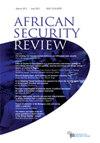Extortionate policing and the futility of COVID-19 pandemic nationwide lockdown in Nigeria: Insights from the South East Zone
IF 1.1
Q3 INTERNATIONAL RELATIONS
引用次数: 6
Abstract
ABSTRACT The emergence of the novel coronavirus (COVID-19) in November 2019 has nearly brought the world to a halt. Recording her first COVID-19 case on 27 February 2020, the Nigerian government’s default response to the pandemic was to lock down major parts of the country, among other measures. Despite the nationwide lockdown, inter-state travel continued unabated as many travellers bribed their way through the different checkpoints mounted by security agencies. As a result of the prevalence of ‘normed corruption’, the lockdown only created opportunity for brazen extortion by law enforcement officials. Using the institutional corruption theory as our framework of analysis, and coupled with the use of both primary and secondary data generated during the lockdown, the paper noted that entrenched culture of extortionate policing in the ranks of security forces meant that arrest and prosecution of violators of the lockdown became a distant concern. The result is that COVID-19 suspects or carriers travelled from one state to another without being detected. It concludes that Nigeria should leverage lessons learned from policing COVID-19 in framing future responses in containment measures.勒索警察和新冠肺炎疫情在尼日利亚全国封锁的徒劳:来自东南地区的见解
摘要2019年11月新型冠状病毒(新冠肺炎)的出现几乎使世界陷入停滞。2020年2月27日,尼日利亚政府记录了她的第一例新冠肺炎病例,对疫情的默认反应是封锁该国的主要地区,以及其他措施。尽管全国封锁,但由于许多旅行者贿赂通过安全机构设立的不同检查站,州际旅行有增无减。由于“规范化腐败”的盛行,封锁只会为执法官员的无耻勒索创造机会。该论文以制度腐败理论为分析框架,并结合使用封锁期间产生的主要和次要数据,指出安全部队中根深蒂固的勒索警务文化意味着逮捕和起诉违反封锁的人成为一个遥远的问题。结果是,新冠肺炎嫌疑人或携带者从一个州到另一个州都没有被发现。它得出的结论是,尼日利亚应利用从新冠肺炎警务中吸取的经验教训,制定未来的遏制措施。
本文章由计算机程序翻译,如有差异,请以英文原文为准。
求助全文
约1分钟内获得全文
求助全文

 求助内容:
求助内容: 应助结果提醒方式:
应助结果提醒方式:


